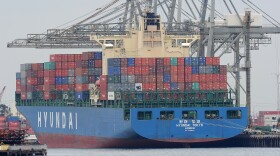
Marilyn Geewax
Marilyn Geewax is a contributor to NPR.
Before leaving NPR, she served as senior business news editor, assigning and editing stories for radio. In that role she also wrote and edited for the NPR web site, and regularly discussed economic issues on the mid-day show Here & Now from NPR and WBUR. Following the 2016 presidential election, she coordinated coverage of the Trump family business interests.
Before joining NPR in 2008, Geewax served as the national economics correspondent for Cox Newspapers' Washington Bureau. Before that, she worked at Cox's flagship paper, the Atlanta Journal-Constitution, first as a business reporter and then as a columnist and editorial board member. She got her start as a business reporter for the Akron Beacon Journal.
Over the years, she has filed news stories from China, Japan, South Africa, and Europe. She helped edit coverage for NPR that won the Edward R. Murrow Award and Heywood Broun Award.
Geewax was a Nieman Fellow at Harvard, where she studied economics and international relations. She earned a master's degree at Georgetown University, focusing on international economic affairs, and has a bachelor's degree from The Ohio State University.
She is the former vice chair of the National Press Club's Board of Governors, and currently serves on the board of the Society of American Business Editors and Writers.
-
President-elect Trump has interests in hundreds of businesses. Many government agencies and policies could affect his profits. Here's a look at some of his businesses, and the possible conflicts.
-
Investors who had been showing fear in recent weeks at the prospect of a Donald Trump presidency drove down equities, currencies and Treasurys as the election results became clear.
-
This year's unconventional presidential race has some stock analysts worried about unpredictable markets. NPR's Marilyn Geewax talks about why and how politics are roiling the financial markets.
-
The Democrat wants to double the credit for parents of children 4 and under. It would be paid for by a tax on Wall Street, the wealthy, corporations. Trump's tax plan would most benefit the wealthy.
-
If it shows steady unemployment and job growth figures, that would help Democrat Hillary Clinton. If the numbers get worse, that would give an edge to Republican Donald Trump.
-
By voting to exit the European Union, Britons increased fears of recession. That has caused many prices to fall. Now economists aren't sure whether cheaper goods and loans will help or harm Americans.
-
The president went back to the Indiana town to highlight its economic rebound. Since he first visited in early 2009, the unemployment rate has plunged from about 19 percent to around 4 percent.
-
If Congress were to approve the TransPacific Partnership, the economy would expand by .15 percent by 2032, according to a report by the U.S. International Trade Commission.
-
Takata, the Japanese auto parts supplier, now must fix up to 40 million more faulty air bag inflators. The U.S. Department of Transportation says this is the biggest safety recall in history.
-
Americans shared their views on trade with NPR and member stations. One thing is clear: Millions of voters have deep feelings about trade — and often are at odds with each other about it.










